Marketing Ops Best Practice Guide
The What, Why, How of Marketing Operations
Let's start with defining what Marketing Operations is, and why it's so important. Marketing Operations is a role (or function) that is becoming increasingly important for organisations, as the selection and day to day operation of marketing technology becomes more central to the success of the marketing function, and to overall business success.
Marketing Operations is often seen as the missing link in martech strategy, as its purpose is helping to ensure that investments in marketing technology deliver a positive return, that reporting and analytics are meaningful and accurate, and that marketing strategy and execution are aligned.
In this guide, we’ll look at the purpose of the marketing ops role, why it has become more important , how marketing ops teams are structured, and the responsibilities of the function.
What is marketing operations?
Let’s start with a definition of Marketing Operations:
Marketing ops is the management of marketing, technology and data as an integrated process. It’s a role that ideally combines some of the creativity of marketing with the technical and analytical knowledge required to assist in the procurement and day to day management of marketing technology.
It’s a strategic function that is designed to lead marketing technology management within a business. The marketing ops function designs, optimises and governs operational marketing processes to improve performance and reduce waste to deliver the marketing strategy.
As Darrell Alfonso, Global Marketing Operations Leader at Amazon and Marketing Operations Essentials Course Instructor says:
“The way I like to define marketing operations is ‘the art and science of executing great marketing.”
This is a great definition which underlines the intersection of creativity and technical knowledge which makes a great marketing ops professional.
Practically speaking, marketing ops is typically responsible for a number of key processes:
- The administration of martech platforms. Marketin Ops Professionals (MOPS) typically own or oversee the acquisition and usage of marketing technology. It sets the overall strategy on driving business value from these different platforms, and outlines governance, training, and adoption for stakeholders.
Administration of martech platforms also includes the management of data within these platforms, which includes monitoring database health and hygiene, as well as customer data compliance and consent.
- The building and execution of campaigns. Campaign planning, financial planning construction, execution, reporting, and optimisation of marketing campaigns that engage the end customer. There are a multitude of campaign types, and many ways for marketing operations to strategically run campaign ops to drive high-value results in a repeatable, scalable way.
The marketing ops role also includes keeping an eye on finance and budget, and making sure there is long term support for marketing. - Facilitating accurate and actionable marketing data and reporting. Marketing ops should enable accurate, meaningful and actionable marketing reporting. Measurability is at the heart of good marketing ops. The reporting and the socialisation of critical business insights makes marketing ops a much more strategic role.
- Partnering to build internal marketing products and processes. Marketing ops is like an interface role that bridges the gap between the marketing and other departments including IT. In this sense, marketing ops is very much part of marketing but there may be a dotted line to the IT department. This role is becoming increasingly valuable to make sure the data supply chain is set up to support marketing objectives. While not always directly involved in development, marketing ops can help to drive creating mechanisms that simplify and streamline marketing efforts, and create a better customer experience. (1)
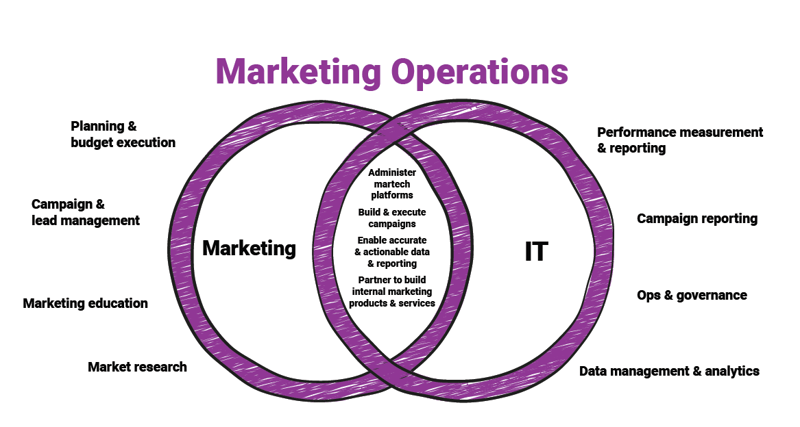
What marketing operations is not
Marketing operations can often become confused with other functions with an organisation. For the sake of clarity, these are some of the areas often confused with marketing ops.
- Marketing automation. Marketing automation platforms do include many functions that marketing ops is responsible for, but they are not the same. Marketing operations is the art and science of executing great marketing. Not all great marketing is automated. Marketing automation is the programmatic part of marketing operations. In that sense, marketing automation is part of the greater marketing operations charter.
- Sales operations. Both departments are involved in the mechanics, enablement and support for their departments. In large enterprises, they are generally discrete functions. Although, if your team is small, marketing operations may support both departments.
- Demand generation. Marketing ops enables demand generation. Demand generation is just a component of a fully formed marketing strategy.
The marketing ops function plays a critical role in ensuring that marketing functions efficiently and effectively. A common challenge for operational functions is that they can remain invisible until something goes wrong.
Darrell Alfonso is the lead tutor on our Marketing Operations Essentials course. He says the unfortunate truth is that when marketing operations is working well, it’s hard to tell. But when there is an issue, it surfaces quickly. 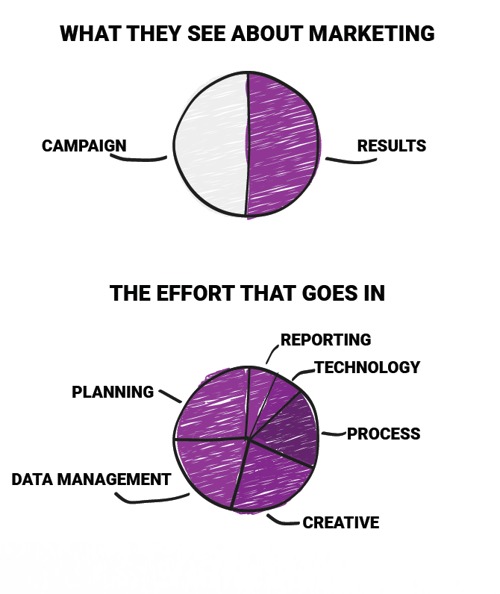
If marketing operations is awesome - it's hard to tell. If marketing operations makes a mistake - it surfaces quickly. (2)
Marketing teams may attract attention with creative award-winning campaigns and case studies showing fantastic results, but a lot of the work that underpins the success of marketing initiatives - the tech, the planning, reporting - comes from marketing operations.
“Marketing ops is like the pit crew, and sales and marketing are the race car drivers. Marketing operations replaces the wheels, tunes up the engine, refuels, keeps an eye on all the instrumentation and constantly talks to the driver to find out what he or she needs.
An effective pit crew enables a driver to focus on winning the race, and not on things like if his or her car will fail during the race. The more planning, guardrails, and smart processes we have in place, the faster marketers can go.”
Darrell Alfonso, Global Marketing Operations at Amazon & Marketing Operations Essentials Course Instructor.
Why is Marketing Ops so important?
Why do you need a marketing ops function in your organisation?
If you’re lucky enough to have the skills in your team, perhaps you can manage without marketing ops. The reality is though that the marketing ops role requires specialist knowledge, skills and activities that may not exist within the marketing team. For many businesses though, there are clear benefits to having that role.
Here are some of the key benefits that marketing operations can bring to your company:
1. Improved tech selection
There’s now a greater volume of tech available on the market, and companies are using multiple martech solutions. The complexity of this tech and the need to analyse, evaluate and integrate multiple platforms to facilitate data flow requires specialist knowledge.Marketing ops can provide this.
Marketing ops expertise can ensure that the right tech is acquired to help marketers meet their goals.
2. Effective management of the tech stack
Acquiring tech is just the beginning. The day to day management of martech solutions, and the processes and training required to ensure that the tech can deliver on required marketing goals is all made easier by marketing ops.
3. Streamlined and improved reporting
Effective marketing ops brings clarity to reporting, making it more insightful and actionable.Marketing ops should be deeply involved in the collation, curation and circulation of data & insights around the business.
The result should be an understanding of how marketing efforts are impacting the sales pipeline, brand, customer acquisition and retention, and overall revenue.
4. Improve data-driven decision making around the business
The data gathered and crunched by marketing ops can produce valuable customer insights, which should lead to better decision making. The valuable real-time data produced by marketing ops can have a key business impact.
5. Justify marketing expenditure
Thanks to improved reporting processes, marketing ops equips you with clarity in terms of the relationship between marketing expenditure and ROI.
This enables you to justify expenditure and build a strong case for marketing investment.
6. Improved operational efficiency
Marketing ops can create and manage marketing operating procedures to create streamlined workflows which reduces waste and improves efficiency and effectiveness.
7. Greater alignment and collaboration between internal teams
Marketing Ops can facilitate alignment between internal teams. For example, helping sales and marketing to build more productive relationships.
Marketing ops' ability to deliver clarity in terms of data and reporting helps to eliminate politics and functional issues which can divide teams. This opens lines of communication and alignment between teams.
8. Removing departmental silos
Without marketing ops, teams often operate in silos, without much cohesion to their efforts. The marketing ops role helps to ensure that each marketing program and campaign is executed according to agreed plans and processes.
The evolution of marketing ops
Even if it wasn’t named as such, the marketing ops role has existed as long as marketing has, as the office work and organisation which sits behind marketing campaigns.
In modern terms, the marketing ops function has evolved with the digitisation of modern marketing, and the development of marketing technology.
The role’s importance right now is closely tied to the growth of marketing technology and the need to focus on the customer experience.
Martech has become essential for the modern marketer, as the day-to-day operation of marketing teams, and the need to provide the best possible customer experience, now requires investment in technology.
Customer experience is a strategic battleground in many sectors and, thanks to the shift online accelerated by the Covid-19 pandemic, more customer touchpoints are now digital.
In fact, in our 2021 CX Trends Report, 78.5% of marketers agree that delivering an amazing customer experience is a powerful competitive advantage. This has increased the need for well managed marketing tech required to crunch data in order to customise and personalise digital experiences, at scale. (3)
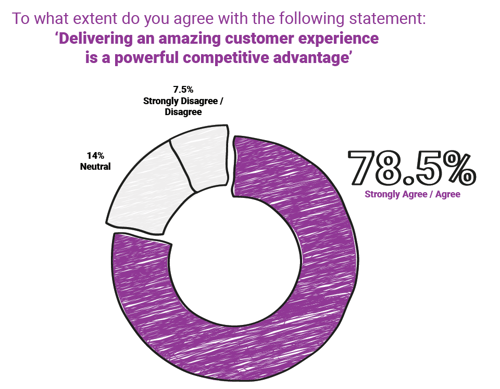
As traditional marketing and digital marketing have converged in recent years, so too has the requirement for technology tools to manage marketing activities. According to chiefmartec.com, the average enterprise deploys 120 different marketing tools. (4)
In fact, marketers have more than 8,000 martech vendors to evaluate in order to find solutions to the challenges they face. (5)
This complex landscape is challenging for marketers to navigate. Choosing the right technology and integrating it into the existing tech stack requires time, effort and expert knowledge.
According to research conducted for our 2022/23 Martech Report, marketing technology now accounts for 23% of overall marketing budgets. In fact, the value of the global martech market was estimated to be $344.8bn in 2021. (6)
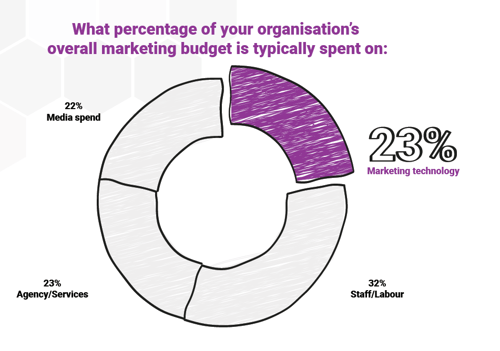
With marketing technology budgets set to grow further - 61% of agencies and marketers expect their own or client budgets to increase during 2022 - marketing operations professionals are set to be in greater demand than ever before. (6)
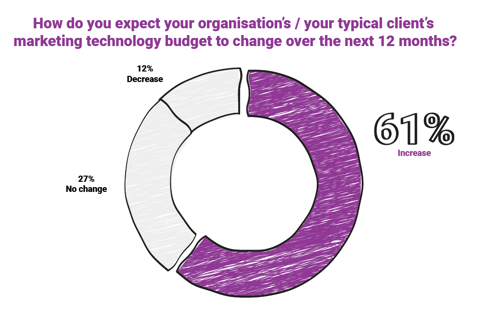
In practice, neither a pure marketing function, nor an IT department has the right balance of marketing knowledge and technological expertise to evaluate martech. A marketing operations function bridges this gap. They have the technological, data and strategic awareness to set up, integrate and optimise martech tools.
“The role of marketing ops is more important than ever. The explosion of digital, means more data and tech than ever. And with this comes an ever increasing need for MOPs with the skills and knowledge to ensure the right governance, administration, stack management, and measurability is in place to drive success.”
- Darrell Alfonso, Global Marketing Operations at Amazon & Marketing Operations Essentials Course Instructor.
Another reason for the growth of the marketing ops role is the sheer complexity of operating tech tools on a day to day basis.
Our 2021/2022 Martech Report identified key barriers to investment and use of marketing technology in a survey of agencies and senior marketers.
Many of the reasons given, such as measurement and metrics, tech integration, and a lack of understanding of available tech, are areas which marketing operations can handle.
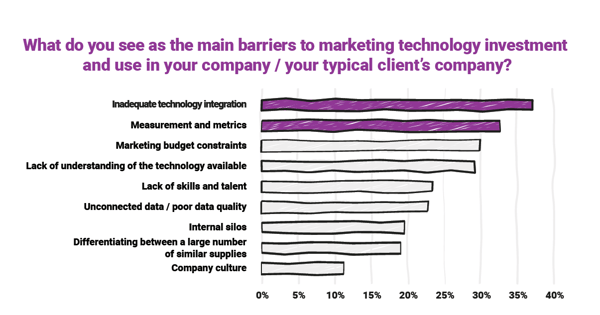
Where will this evolution take us next? Darrell Alfonso sees potential for the role of the CMO to change.
“Marketing ops touches every part of the business. It’s a function that gets results, that drives tangible business value. So with increasing pressure on CMOs to deliver on business goals, to drive revenue, to demonstrate true marketing impact, it’s logical that MOPs will be those well placed to fill future CMO roles. So it's a great place for us to be building our skills and knowledge."
Where does marketing ops fit into your organisation?
Marketing operations will usually sit within the marketing team, reporting directly to a marketing leader. This will usually be the CMO or VP of Marketing.
It’s beneficial to have ops reporting to a high level marketing leader, as this can help bring some balance to the conflicting goals that marketing tends to have.
One of the most common conflicts in organisations is that between wanting to move quickly, against doing things in the correct way, with the highest possible quality.
For example, if marketing operations reports into a team that is goal-oriented on a high volume of campaigns for the year, that quantity goal may take precedence over quality.
IT is another department that marketing operations can fit into, and this is common in very large organisations. Marketing ops manages marketing technology and so can be seen as ‘system admins’, and there are many qualities and responsibilities it has in common with IT.
One advantage of this approach is the ability to quickly pull in needed technical resources when system problems arise in the day-to-day job of a marketing ops professional.
It can help to ask who is in control of the key functions - IT or marketing? Or is it a more collaborative approach?
A survey for the 2021/2022 Martech Report found that, in the majority of cases, the responsibility is shared, though it generally leans more towards marketing than IT. (6)
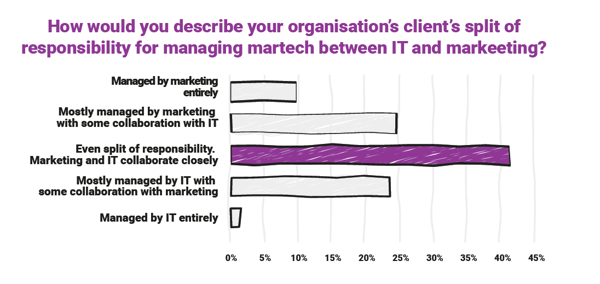
In cases where responsibility is split, marketing may fully control the selection of a technology relating to email marketing. On the other hand, IT may lead on the implementation and configuration of technology relating to compliance and security, with the two departments working closely on developing the overall marketing ops roadmap.
Marketing ops is also sometimes a part of the revenue operations team, especially the tech space. It’s not clear if the revops department will transcend all industries of all sizes though.
This team consists of sales operations, marketing operations, and customer success operations, who all would report to the same leader, the head of revenue operations.
The benefit of a structure like this would be clear alignment, to make sure that the goals of each group support the overall goals of the organisation. RevOps is about aligning systems and data, and processes, across marketing, sales and customer service, so that the priorities remain centred on the customer and their buying journey, limiting departmental silos.
How to organise your marketing ops team
Your marketing operations team will depend very much on the size of your organisation. A small marketing ops team might only consist of a marketing operations manager, whilst larger teams may include multiple roles which might include data analysts, technologists and other specialists.
As we’ve already explained, this team can make a huge difference in the day-to-day operations of your business. But remember: the team shouldn't just be filled with marketers. Analytical and process oriented professionals may not identify themselves as marketers but they have a clear value to add to a marketing operations function.
When establishing a marketing ops team, it is important to consider the following guidelines:
- Audit how workflow and marketing technology is currently managed. This will offer some insight in terms of the operational and technological gaps that can be filled by the function.
- Establish goals and objectives. It is important to set clearly defined goals for this function. This is important as it sets a precedent for future decision making regarding technology. Build your team and tools around your goals, not your goals around your tools and teams.
- Define barriers. Without a clear structure and defined roles, there exists potential for risks around data governance and duplication of workflow. Every member of the team should understand their roles and responsibilities, and the value they add within the team and within the company.
- Communicate the value of the Marketing Operations function. All teams within your business should understand why a marketing operations team is beneficial, and how it can help them and the business. This is good for establishing responsibilities and budget. These moves require marketing leaders to communicate with the teams clearly and consistently.
- Build a plan. This multi-step plan needs to consider a few components for each phase:
- Audit gaps in the marketing stack.
- Analyse skills gaps.
- Update team roles and duties.
- Restructure the marketing department.
Marketing ops team structure
Operational excellence without strategic impact offers little value. The key lesson in organising the marketing ops team is to balance strategic impact with operational excellence.
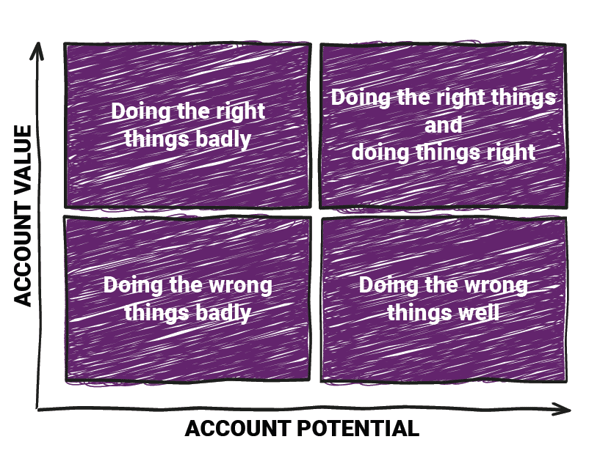
Edward Unthank, Founder and CEO of Etumos conceptualised the following framework which offers useful guidance for organising the marketing operations function into four key areas:
- Platform Operations. They provide system support, training, stack interconnectivity and more. If the team is large, each individual may have a specific specialisation; from managing the CRM to marketing automation.
- Campaign Operations. Campaign operations can be done in a central, agency-model way, with experts who in-take campaign requests and build to spec, and consult on best practices. They can also be set up in a decentralised model, in which any digital marketer can build campaigns.
- Marketing Intelligence. Marketing intelligence is responsible for reporting and analytics. It can be a hybrid role, for someone on the team already, or involve a designated specialist skilled in data science and analytics.
- Marketing engineering. Marketing engineering is often seen in large enterprise companies, who have development resources assigned to marketing, in order to build products and data management. Smaller businesses will have shared resources or will use third-parties, such as agencies or contractors.
How to demonstrate ROI from marketing operations
If a marketing ops team can show its value company-wide, and to the highest leadership level, there will be a clear case for further investment to support the team goals and vision.
“Our ability to show the tangible value of marketing ops will be the difference in gaining or retaining our marketing budget, building headcount and being able to get the leadership support to deliver on new initiatives. Simply put, if we show we are removing wastage, increasing revenues and improving the customer experience, we are doing our job and can look to drive business performance further with more investment.”
- Darrell Alfonso, Global Marketing Operations at Amazon & Marketing Operations Essentials Course Instructor
The key to proving ROI is to avoid vanity metrics, and focus on clearly defined performance indicators This means deciding on key performance metrics and reporting them in a consistent and clear way.
It also helps to keep it brief, to ensure that metrics are understood across the business, especially those making decisions on budgets.
Use the following steps to communicate ROI from marketing ops:
- Know your numbers and narrative. Keep it concise and clear.
- Ensure your metrics connect to wider business goals and strategy.
- This isn't about asking for money. It's about proving you'll be making money. Marketing ops should be seen as a revenue generating department, not another cost. Make sure you show the senior leaders what this new piece or tech, or new team member, will be bringing in regards to business performance.
- Contextualise the need for the investment in the current landscape. Think trends, tech changes, consumer behaviour, and competitor actions.
- Keep it brief.
- Detail what the investment will deliver for the business based on outcomes, not technical detail.
Who does marketing ops work for?
The marketing ops function is clearly within the remit of marketing but it’s worth understanding that because this is a strategic function, there are multiple stakeholders.
- Chief Executive Officer (CEO).They'll expect the team to positively impact revenue, and align with the rest of the organisation's goals.
- Chief Information Officer (CIO). They'll want the team to make full use of the software tools that they have invested in while maintaining compliance with data security protocols. They'll also be involved in signing off and supporting the set up of future technology investments.
- Chief Marketing Officer (CMO). This individual will expect the team to align with sales, build a marketing funnel, and create scalable processes.
- Director of Marketing. The director expects the team to work closely with the creative team to inform campaigns, track data, and keep an eye on the campaign when it's live.
What does the future hold for marketing operations?
“Marketing operations professionals will be the future marketing and business leaders"
- Darrell Alfonso, Global Marketing Operations at Amazon & Marketing Operations Essentials Course Instructor
Marketing operations professionals have the skills and abilities to go far. Some already have. Apple CEO Tim Cook comes from an operations background.
These individuals have the potential to rise to the top, because of their broad exposure to multiple areas of the business, and their ability and track record of achieving results and generally getting things done.
They have the context, the birds-eye view, and the applicable skills to approach a number of different issues, in a number of different teams in a single business.
One key challenge for marketing ops professionals is keeping up with technology, as this is an integral part of their position. This means continuous learning will become vital - MOPs professionals need to upgrade and improve their personal skills stacks, just as they’re doing with martech stacks.
Broader trends point to more data, more complex customer journeys, greater challenges around privacy, and new ways to engage customers. Meanwhile, martech tools will continue to democratise tech, making it more accessible.
The use of no code / low code technologies in key martech tools is one such example, which potentially allows marketing ops teams to be in control of their tech and processes, without the need for developers.
In summary
With technology at the heart of much modern marketing strategy, marketing ops is a role we’ll hear more and more about in the coming years. Already a massive advantage for businesses, it’s likely to become an essential role.
It’s a function that touches every part of the business, that gets results and drives demonstrable business value. Marketing Ops teams already provide a massive advantage for businesses; in future it will become an essential role.
Citations
Source : https://blogs.gartner.com/marc-brown/marketing-ops-vital-sales-c-suite/Source: Darrell Alfonso, LinkedIn post, December 2021. (https://www.linkedin.com/feed/update/urn:li:activity:6861287273858760705/)
Source: MarTech Alliance / Treasure Data ‘2021 CX Trends Report’, MarTech Alliance, June 2021. (https://www.martechalliance.com/cx-research-report)
Source: Scott Brinker, ‘The average enterprise uses 1,295 cloud services’, chiefmartec.com, March 2020. (https://chiefmartec.com/2020/02/average-enterprise-uses-1295-cloud-services/)
Source: Scott Brinker, ‘Marketing Technology Landscape Supergraphic (2020)’, chiefmartec.com, June 2020. (https://chiefmartec.com/2020/04/marketing-technology-landscape-2020-martech-5000/)
Source: MarTech Alliance / Moore Kingston Smith, ‘The Martech Report 2020/2021’ MarTech Alliance, October 2021. (https://www.martechalliance.com/martechreport)
